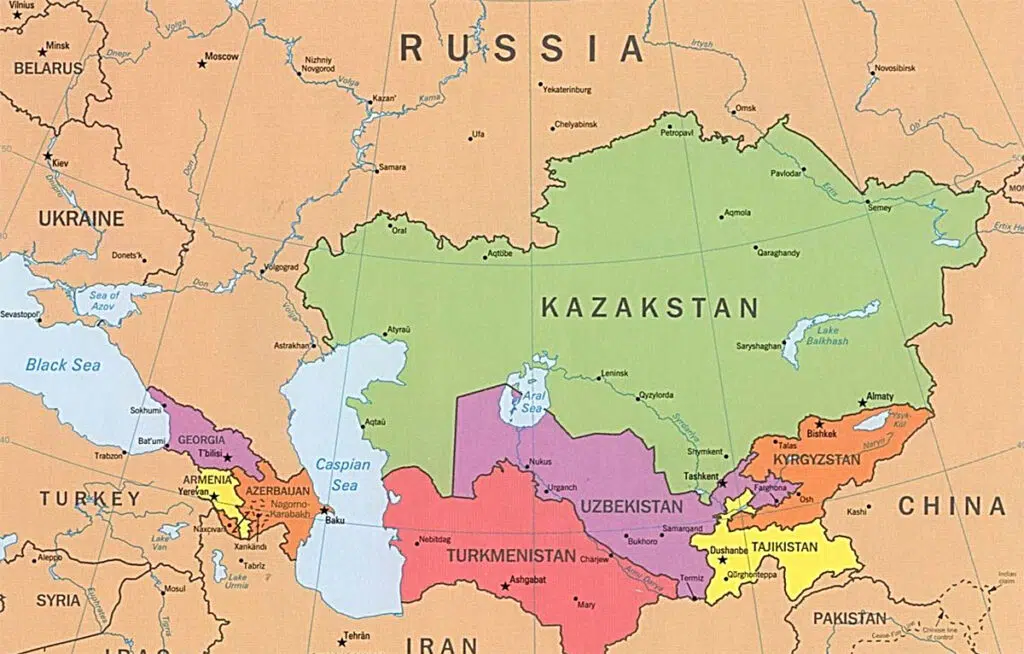
Putin’s dumpster fire is China’s opportunity
Keen to demonstrate that he is not diplomatically isolated, Russian President Vladimir Putin held a meeting with his Chinese counterpart Xi Jinping on the sidelines of a Shanghai Cooperation Organization (SCO) summit held in Uzbekistan on September 15-16.
“We are ready together with our Russian colleagues, to set an example of a responsible world power and play a leading role in bringing such a rapidly changing world onto a trajectory of sustainable and positive development,” Xi said.
Prior to his meeting with Putin, Xi also met with the presidents of Tajikistan, Uzbekistan, Turkmenistan, and Kyrgyzstan promising closer ties with the Central Asian republics. These countries send millions of labor migrants to Russia every year; however, they are increasingly reliant on China for economic support in a way that Moscow just cannot match.
As the summit wrapped up in Samarkand, Uzbekistan, there was no escaping the fact that the Former Soviet Union is a dumpster fire adjacent to a fireworks factory. Armenia and Azerbaijan were fighting again, and more than 100,000 people had to be evacuated from their homes and businesses in southern Kyrgyzstan because of cross-border fighting with Tajikistan on September 16.
The humiliating withdrawal of Russian troops from key areas of Ukraine a few days earlier underscored the sense that if Moscow was once the dominant dog in the SCO, its tail is now firmly between its legs.
Putin has a track record of ostentatiously making leaders wait for him. In Uzbekistan, the leaders of Turkey, Azerbaijan, India, and Kyrgyzstan could not be bothered to be punctual for their meetings with him.
The Russian President was also publicly upbraided by the President of India for launching his ‘special operation’ against Ukraine, and despite China’s exhortation that Putin is an “old friend” Beijing is unlikely to jeopardize its global status even further by associating itself too closely with Putin’s deadly gambit.
State Department spokesman Ned Price said on September 15, “We made very clear to the [People’s Republic of China (PRC)], both in public but also at the highest levels – the highest levels – that we would be watching very closely, and any PRC effort to provide military assistance to Russia or to help Russia, on a systemic basis, circumvent the sanctions that have been put in place would incur significant costs. And we have not seen any change on the part of the PRC.”
But Price is missing the point. China does not need to overtly support Russia; it can let the likes of Iran and North Korea do that sort of dirty work. It is looking at a win-win situation regardless of the outcome in Ukraine. Russia has blown up its relationship, political and economic, with the West and now is increasingly reliant on China which gives Beijing more leverage bilaterally and regionally than before.
The US has lost influence in Central Asia, a vast stretch of steppe, mountain, and desert between Russia and Afghanistan that borders China to the east. It squandered its ability to be a serious player following the disastrous pull-out from Afghanistan in August 2021 and left an open door for China to achieve its strategic aims in the region. With Russia in what appears to be a decline – or at least a tail-spin for now – the opportunity for Beijing to exert itself is enormous.
Central Asia is full of everything China needs, from huge amounts of gas to nearly every element on the periodic table. Governments in the region lean towards autocratic or chaotic, they are deeply dysfunctional, weak and malleable, and, more often than not, broke.
Perfect for Beijing to prey on.
The SCO is a collection of some of the most corrupt states in the world and a forum for China to lead its Central Asian neighbors into further indebtedness to the EXIM Bank in Beijing. Its vast and ambitious infrastructure plans to link China westward to European markets via Central Asia are akin to money laundering schemes.
China lends an impoverished country a massive sum of money to undertake road or rail building. A Chinese state-owned company is then contracted to perform the work. In an effort to repay these loans both Kyrgyzstan and Tajikistan have mulled ceding territory or lucrative mining rights to Beijing. This is a pattern playing out across Asia.
Russia used to be the chief banker with all roads leading to Moscow.
Beijing has usurped this role and Russia runs the risk of becoming just another vassal state. This should be an opportunity for the US to stake out some long-lasting influence in a region of strategic importance even if it is far away from the minds of most American citizens. But it remains to be seen if the Biden administration has the entrepreneurial wherewithal or diplomatic vision to capitalize on it.



